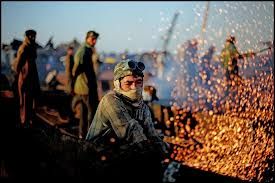
Europe's ongoing recession has seen many firms flounder on the rocks, but for one Turkish ship breaking company, the long-lasting recession has meant more business than ever.
At the Aliağa Ship Breaking Yard in the Aegean province of İzmir, disused and mothballed ships from the world over await their fate at the hands of ship breakers, set to be cut apart and sold as scrap. Business at Aliağa Yards has reached record levels this year, with the Anatolia news agency reporting that Aliağa has already scrapped more ships in the first six months of 2012 than it did for the full 2011 business year. That boom in scrapping, say Aliağa managers, has largely been driven by the crisis in neighboring Greece and the financial havoc it has caused among Greece's massive shipping industry.
Aliağa Yard Waste Management Director Ersin Çeviker told Anatolia this week that the glut of projects began first with state-led liquidations of government ferries. “The Greek government was financing transportation between the main islands. Because of the financial crisis they took away that support last year to make inter-island transport a little more economical. The government was left with idle ships. … And last year there were 21 Greek ships broken in the yards,” he says. “Ever since, we've continued to get ships from Greece. Even though they have different flags, we know that around 70 percent of the owners are Greek firms,” Çeviker continues. Shipping firms often choose to register their vessels in countries with the lowest taxes, rather than with the firm's home country.
The waste director also says that increasingly well-enforced UN and EU mandates against breaking large European-owned vessels on the Indian sub-continent, where the environmental risks of ship breaking are notoriously disregarded, have also helped Aliağa attract more business over the last six months.
The near doubling of breakups at Aliağa Yard is also part of a widening global round of scrapping. According to a July 11 Bloomberg news report, maritime scrap prices have dropped 13 percent over the 2011 business year alone as owners scramble to rid themselves of older fuel-guzzlers amid a 34 percent surge in fuel prices in the last two years and the rising profile of modern emissions regulations. Increasing efficiency demands, says the Bloomberg report, has meant that the average age of ships scrapped dropped to 28.8 years in the year 2012 from around 31.4 in 2011.
As scrappers work overtime to take in as many vessels as possible, however, ship owners also say that the financial crisis may have a silver lining. Prices for new ships have decreased up to 78 percent versus 2008 prices, reported the Greek English daily Ekathimerini on July 17, and many shipping magnates are investing in newer generation vessels. Since the start of 2012, Greek shippers have ordered $1.8 billion in new liquefied natural gas (LNG) tankers alone.
Nevertheless, says Aliağa Yard Waste Director Çeviker, the ship breaking boom is likely to continue. “Just a month ago we were doing 800-2,000 ton vessels, now we're doing 3,500-4,000 ton vessels. We expect the industry will grow to reach about one million scrapping tons this year,” he says.
Source: Today's Zaman
We use cookies to improve your experience. By continuing to use our site, you accept our Cookies, Privacy Policy,Terms and Conditions. Close X